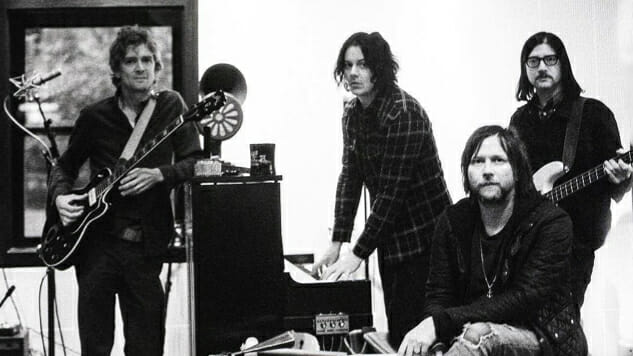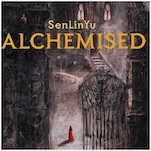The Week In Music: The Best Albums, Songs, Performances and More
Photo courtesy of Third Man Records
It’s the second-to-last Friday of the year, and though album and track releases have thinned out, you don’t have to look as hard as you might think for great new music. As you shop for last-minute Christmas gifts, bake festive holiday treats and start to clean your house to prepare for a family gathering, you might want to take a break from all the “fa la la’s” and jazzy Christmas classics. Consider throwing on some new reissues from David Byrne and Manic Street Preachers or new singles from Cigarettes After Sex or Young Jesus. What could be more festive than listening to a band called Young Jesus? It turns out, a lot of things, but never mind that. This week also saw the long-awaited return of The Raconteurs, who dropped their first new music—two new tracks and videos—in over a decade ahead of their brand new album next year. Indulge in the best new albums, songs, live sessions and Paste features from the past week below.
BEST ALBUMS
Various Artists: True Stories, A Film By David Byrne: The Complete Soundtrack
For fans of David Byrne’s directorial debut True Stories, a delightfully odd musical comedy from 1986, trying to compile a full version of a soundtrack has been a small chore. Byrne’s band Talking Heads recorded versions of many of the songs featured in the movie, releasing them as an album of the same name, and much of the film’s score was released as Sounds From True Stories, though never available on CD. As well, the versions of the songs in the movie, as performed by a cast that included John Goodman and Annie McEnroe, were used as b-sides to singles and reissue filler. This year, those lovers of the cult classic have finally gotten their wish. To coincide with the re-release of True Stories by Criterion Collection, the full package—True Stories, A Film By David Byrne: The Complete Soundtrack—is finally here. And what a glorious package it is. Goodman’s rendition of “People Like Us” is the standout. Byrne’s version on True Stories is a classic, but Goodman takes the tempo up just a notch and throws his whole voice behind it. It’s not the best vocal performance on the album—that goes to McEnroe bringing her drifting, Kate Bush-esque lilt to “Dream Operator”—but it sums up the town of Virgil and the whole journey that Byrne has taken us. As curious as they might be, they put their whole heart into what they do. It’s a simple, sincere message, but sometimes it takes a band as offbeat as the Talking Heads to remind us of just that. It should not have taken us this long to get the complete soundtrack. In that time, Radiohead, which took its name from a song on the album, not only formed, but have been around long enough to be inducted into the Rock & Roll Hall of Fame. But like all good road trips, the destination is worth the drive. —Libby Cudmore
Manic Street Preachers: This Is My Truth Tell Me Yours (20th Anniversary Edition)
The timing couldn’t be more perfect for the re-issue of the Manic Street Preachers’ This Is My Truth Tell Me Yours. It’s hard to look at neo-Nazis marching in the streets and not think “If You Tolerate This, Then Your Children Will Be Next.” It’s hard to hear lyrics like “The world is full of refugees/They’re just like you and just like me/But as people we have a choice/To end the void with all its force” and not think of the people we leave in wire cages or send home to violence. Is it true, then, that as it coincides with the 20th anniversary of the album’s release, that history is doomed to repeat itself? Truth hasn’t aged a day, completely bypassing the tell-tale late ‘90s mope-core veneer in favor of introspection that is musically lush and lyrically harsh. From the Beatles-esque sitar on “Tsunami” to the bitter-candy guitars on “Black Dog On My Shoulder” the album is melancholia for adults. Of course, the album’s singles – “Tolerate,” “The Everlong” and “You Stole the Sun From My Heart” – remain as delicious and urgent as when they were recorded. If anything, they’ve had a chance to marinate and mature. “Tolerate” is still the album’s standout, with James Dean Bradford’s dry opening riff and Nicky Wire’s despondent call-to-arms still capable of chilling your blood. But it’s not all gloom and doom – musically, anyways. “Sun” and “Tsunami,” which grim in subject matter, are endlessly charming on the melody line. Reissues are rarely a necessity, but Truth doesn’t feel like a vanity project. If anything, a new generation needs it now more than ever. Here’s hoping we can right things for the 30th anniversary. —Libby Cudmore
BEST TRACKS
Young Jesus: “Fourth Zone of Gaits”
Young Jesus have shared the video for “Fourth Zone of Gaits,” off their most recent release, The Whole Thing is Just There, out now through Saddle Creek Records. “Fourth Zone of Gaits” feels like an extension of that philosophy. Its guitar chords come in broad, sweeping brushstrokes, Rossiter’s vocals warbling on the edge of revelation. The feeling of motion and stasis informed the creation of the video, directed by Peter Nichols, as well. “None of us surf but we talked about waves a lot,” the band explain in a statement. “Light waves, radio waves, sound waves, the fact that matter exists as both particles and waves. Maybe God is a harp player that invented physics. This is what’s going on in the video.” —Justin Kamp
Cigarettes After Sex: “Neon Moon”
Cigarettes After Sex have shared “Neon Moon,” a cover of the 1992 hit by country duo Brooks and Dunn. The song is the second batch of new music from CAS this year, following the “June’s Crush” / “Sesame Syrup” single. There’s always been an odd affinity for country music in the slowed-down syrup world of dream-pop and its sister genres. Something about the sentimental weepiness of country music’s slide-guitar balladry translates incredibly well to reverbed guitars and drowned-in-the-mix drums. “Neon Moon” is no exception—CAS singer Greg Gonzalez’s tender, androgyne vocals move the track out of the structured framework of radio-friendly country, and into a hazier, more romantic place of distant sounds and more distant lovers. The song floats down to your ears, weightless as a ribbon of light from the moon. —Justin Kamp
The Raconteurs: “Sunday Driver”
As promised, The Raconteurs have shared two new songs (and accompanying music videos), “Sunday Driver” and “Now That You’re Gone,” off their as-of-yet-unnamed forthcoming album, due out in 2019 through Jack White’s Third Man Records. The songs mark the first new music from the band in over a decade. Their last album, Consolers of the Lonely, came out in 2008. New music from the band was first teased back in October by Third Man, and new tracks were previously made available in physical form to subscribers of the label’s Vault series as part of a special edition anniversary re-release of Consolers. You can find everything we know about the band’s new album so far right here. “We’re knee deep in the trenches of our first new album in a decade,” White is quoted as telling Mojo in a press release. “We have a vast amount of genre-pushing songs that bridge the gap between Detroit and Nashville rock and roll. The album sounds like a World War. It’s great to be co-writing songs with Brendan Benson again, the man is a song craftsman.” —Justin Kamp
BEST PERFORMANCES
Blac Rabbit
New York psych-rock project Blac Rabbit stopped by the Paste Studio to perform three tracks from their 2017 self-titled debut EP and their latest single, “Seize the Day,” which came out last month. Catch them live at NYC’s Mercury Lounge on Dec. 30 with support from Sun Parade and Huck, and they’re also playing a New Year’s Eve show at the same venue with support from Cold Fronts and Fruit & Flowers. —Lizzie Manno
Doe Paoro
Los Angeles-based pop and R&B singer/songwriter Sonia Kreitzer (aka Doe Paoro) came into the Daytrotter Studio in Davenport, Iowa, to perform songs from her third album, Soft Power, which came out in on Anti- in October. Kreitzer and her band performed new originals like “Cruelty of Nature” along with a cover of Stevie Nicks’ “Silver Springs.” —Lizzie Manno
FEATURES
The War Over Weezer Is Real on Saturday Night Live
It’s a war that’s been raging since Weezer released its second album over 22 years ago. Has the band lost it? And if so, exactly when and why? Somehow Saturday Night Live aired an entire sketch about it last night. This was clearly written by somebody who’s very familiar with Weezer’s discography and the arguments on both sides of the divide. Leslie Jones, who believes that Weezer is unlistenable after Pinkerton (other than a few songs on the 2001 album), goes head to head with Matt Damon, a staunch Weezer believer who celebrates their entire catalogue. Their impromptu beef disrupts an otherwise pleasant grown-up Christmas party, angering their hosts and embarrassing the life out of their partners, and yet anybody who’s ever felt strongly about Weezer (or any other band) probably understands why it’s so important to stick up for what you believe. Even if you don’t like Weezer (and c’mon, you really shouldn’t—even Pinkerton is bad), if you care about music you’ll feel something when you watch this thing. —Garrett Martin
The Beths Are Paste’s Best New Band of 2018
The Beths’ music exists in a place where every emotion is heightened—hyperbolic, even. On “Happy Unhappy,” one song from the New Zealand band’s excellent debut album Future Me Hates Me, an ex-love lingers in the narrator’s mind just a little too long, leaving her distraught. “But now I’m overthrown / Wish my heart were really made of stone,” she sings. “And I could forget you / Like I really want to.” On whirlwind love song “Little Death,” a crush consumes her, making her feel not only smitten, but also immobile and speechless: “Your smile it makes me weak / And the red spreads to my cheek / You make me feel three glasses in.” Within the loud, reflective world of Future Me Hates Me, every feeling is amplified: Heartbreak is an earthquake; new love is a tidal wave. But for lead singer/band-namer Elizabeth Stokes, mum’s the word on the specifics of those feelings. In interviews, including ours, she’s usually careful not to reveal any startling details. When discussing lyrics, our conversation focuses on process rather than content. —Ellen Johnson
A (Brief) History of Music Censorship in America
As Americans, we are a country of prudes, and our approach to music is no exception. Whether it’s sex, violence, or politics that worms its way into our music (and let’s be honest, it’s usually sex), we squirm like the old fogies we swore we’d never become. The following is an abbreviated timeline of just some of the most egregious instances of censorship against music in the United States. —Katie Cameron
Dear Super Bowl Halftime Show, Give SpongeBob a Chance
If ever there were a longshot, Israel Colunga’s SpongeBob SquarePants petition was it. Colunga posted the petition on change.org in late November, calling on the NFL to arrange the performance of a song called “Sweet Victory” at the Super Bowl halftime show in February. The song figures prominently in the cosmology of SpongeBob, and a live performance would pay tribute to creator Stephen Hillenburg, who died Nov. 26 of Lou Gehrig’s disease, or ALS. He was 57. The petition was a nice idea, as a kind of inside joke for fans of the beloved animated show about a nerdy yellow sea sponge who lives in a pineapple, and the underdog adventures he has with his pals in Bikini Bottom, on the ocean floor. Colunga created the petition in response to a Twitter thread about “Sweet Victory,” and then mostly forgot about it. Naturally, it went viral: nearly a million people have signed their names over the past three weeks, the writers of “Sweet Victory” have expressed their support and even the host of Super Bowl LIII—Mercedes-Benz Stadium in Atlanta—tweeted a SpongeBob gif last weekend in apparent acknowledgement of Colunga’s effort. —Eric R. Danton
The Curmudgeon: The Case for Paul McCartney
When the Beatles first arrived in America in 1964, it sparked a fervent debate among 14-year-old girls from Seattle to Miami: Who is your favorite Beatle? Was it Ringo, the goofy one; Paul, the cute one; George, the silent one; or John, the brainy one? Music critics are really no different from those girls, and they’ve been engaged in the same debate for more than half a century. For most critics, the answer has been John, the Beatle who wrote books, led protests, attacked sacred cows and confessed his misery to the world—all activities that critics can relate to. His sainthood was confirmed when he was martyred by a forerunner of the modern era’s most dangerous cult: deluded people with guns. As 2018 draws to a close, we have a new solo album from Paul McCartney and four box-set treatments of older albums: the Beatles’ White Album, John Lennon’s Imagine, Paul’s Wild Life and Paul’s Red Rose Speedway. And listening to all this music has prompted this critic to make the case for Paul as his favorite Beatle—the most important Beatle of all. —Geoffrey Himes







































